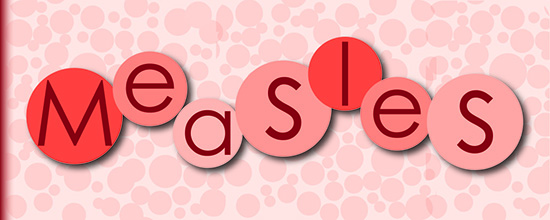Measles

What is measles?
Measles is a serious, highly contagious disease caused by a virus. The virus is spread easily through the air when an infected person coughs, sneezes, or by direct contact with infected nose or throat secretions.
What are the signs and symptoms?
Symptoms of measles include:
- Fever of 101F (38.3C) or higher
- Cough, coryza, or conjunctivitis
- A generalized maculopapular rash lasting three days or more
Initially, a high fever, runny nose, cough, and red, watery eyes develop, followed by the rash. The rash usually starts on the face, hairline, behind the ears, and neck, and then spreads to the rest of the body. The fever typically begins about 10 days (range 7 to 18 days) after exposure, and the rash appears about 14 days after exposure. Infants and adults are usually sicker than children and teenagers.
In the United States, death from measles has occurred at a rate of about 2 to 3 per 1,000 cases in recent years. These deaths occur mainly in children younger than 5 years of age, primarily from pneumonia and occasionally from encephalitis. Other complications include ear problems, diarrhea, and brain damage.
Should a person with measles stay home?
Measles is very contagious. Someone with measles is contagious from four days before the onset date of the rash through the end of the fourth day after the onset of the rash (the onset date of the rash is day zero). During this time, those infected should stay home and not attend work, school, or social activities unless they are seeking medical care. If seeking medical care, patients should call ahead to the medical facility and local health department to make arrangements to minimize exposures.
What is the treatment for measles?
Treatment includes bed rest, fluids, medicine for fever and headache, and managing other symptoms as they occur. Antibiotics do not help and will not cure measles or prevent the disease. For instance, when antibiotics are used, they are given to treat other infections that have occurred as a result of measles, like pneumonia. There are no antiviral drugs for treating measles.
Can measles be prevented?
The best way to prevent measles is through vaccination. The measles vaccine is recommended for children at 12-15 months of age, with a second dose recommended at 4-6 years of age. The vaccine is called MMR and is given to help protect from measles, mumps, and rubella. If an outbreak is declared on the installation, children who are enrolled in care at CYS facilities on post are required to meet the age/vaccination requirements or will be excluded from care. There is another combination vaccine called MMRV that also helps protect against varicella (chickenpox).
Most adults are recommended to have at least one dose of MMR. Some groups are recommended to have two doses; this includes all persons working in health care and anyone 6 months of age and older who plans to travel internationally.
During an outbreak, children between the ages of 6 months through 1 year old, are able to receive one dose of the vaccine. If they receive a dose at that age, they are required to follow the CDCs normally recommended scheduled. Children who have already received their 1-year MMR vaccination are also able to receive their second dose before their 4-6 year vaccination as long as it has been at least 28 days since the previous vaccination.
Who should not get the vaccine?
Persons born before 1957 are likely immune because they may have had measles.
Women should not get the vaccine if they are already pregnant or if they plan to become pregnant within three months after getting the vaccine.